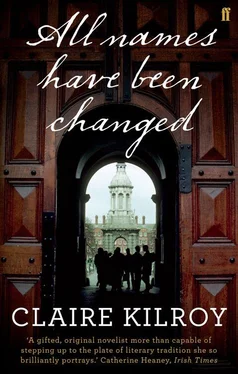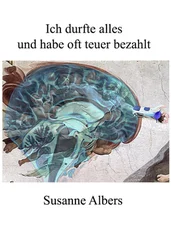Claire Kilroy - All Names Have Been Changed
Здесь есть возможность читать онлайн «Claire Kilroy - All Names Have Been Changed» весь текст электронной книги совершенно бесплатно (целиком полную версию без сокращений). В некоторых случаях можно слушать аудио, скачать через торрент в формате fb2 и присутствует краткое содержание. Год выпуска: 2010, Издательство: Faber & Faber, Жанр: Современная проза, на английском языке. Описание произведения, (предисловие) а так же отзывы посетителей доступны на портале библиотеки ЛибКат.
- Название:All Names Have Been Changed
- Автор:
- Издательство:Faber & Faber
- Жанр:
- Год:2010
- ISBN:нет данных
- Рейтинг книги:5 / 5. Голосов: 1
-
Избранное:Добавить в избранное
- Отзывы:
-
Ваша оценка:
- 100
- 1
- 2
- 3
- 4
- 5
All Names Have Been Changed: краткое содержание, описание и аннотация
Предлагаем к чтению аннотацию, описание, краткое содержание или предисловие (зависит от того, что написал сам автор книги «All Names Have Been Changed»). Если вы не нашли необходимую информацию о книге — напишите в комментариях, мы постараемся отыскать её.
All Names Have Been Changed — читать онлайн бесплатно полную книгу (весь текст) целиком
Ниже представлен текст книги, разбитый по страницам. Система сохранения места последней прочитанной страницы, позволяет с удобством читать онлайн бесплатно книгу «All Names Have Been Changed», без необходимости каждый раз заново искать на чём Вы остановились. Поставьте закладку, и сможете в любой момент перейти на страницу, на которой закончили чтение.
Интервал:
Закладка:
One of the teenage boys started cursing. ‘Yiz were supposed to put it in the other way around,’ he shouted. ‘Yiz were supposed to blow it up, ya stupid fucken spas. Here, show us it.’ He gestured at the cat, which cowered beneath a wall too high for it to scale.
We dived at the creature, a pack of foxhounds. The children were more agile than me. They brought the flailing animal back to the boy, who seized it by a hind leg. The cat, a thrashing mass of terrorised muscle, must have bitten or clawed the boy, because he cried out in anger and pitched it on the bonfire. The small body twisted in the air before landing in the flames. Each of us fell still to watch. Every last child was quiet.
I was seized from behind and my face rammed against the hoarding. ‘Ya fucken perv,’ came the voice of an adult male, his teeth close enough to bite my ear. I hadn’t noticed any men on the building site. I tried to get a look at him over my shoulder, but he kneed me in the kidneys and threw me down on the ground. I got onto my hands and knees. The cat was screaming.
A kick under the ribs flipped me onto my back. The two of us were face to face then. His head was shaved and leathery, burnished orange by the bonfire. He bent down and took hold of my collar. ‘Filthy bollocks,’ he spat, ‘spying on the kiddies.’
His knuckles connected with my face, just beneath the eye socket, slamming the back of my head into the stony ground. There was a crunch. The stars floating in my eyes merged with the fireworks in the sky. ‘Please,’ I whispered. A girl was shrieking hysterically, but not for me. The wail of a siren approached.
The man punched me a second time, with greater force. ‘Here, youse,’ he called over his shoulder. There were more of them. I wrenched out of his grasp and scrambled for the hoarding. ‘Get back here now,’ he commanded me.
The sirens were almost upon us by then. The children rushed off the building site, and I joined their number. We flowed like rats through the gap in the hoarding. A stolen car screeched sideways around the corner, a garda van with lowered riot shield in close pursuit. Locals were out banging dustbin lids against the pavement. The children dispersed into the back lanes and flats, but three men were chasing after me. There was a loud phht not far from my ear, like a huge cat spitting, then a shower of sparks as the rocket collided with steel security shuttering ahead. A fire engine came hurtling along Gardiner Street, followed by an ambulance, and when next I looked over my shoulder, the three men were gone. I was running down a dark empty road on my own.
9 Amongst Women
The four, my four, the Square of Pegasus, the Northern Cross, were there ahead of me when I arrived at the workshop the following Wednesday. The furniture had been rearranged, on whose instructions, I never asked. The small individual tables had been pushed together into the centre of the room to form one large desk, around which nine chairs were placed. At the head of this expanse of reticulated tabletop, the bulky desk with the drawers was set. Glynn did not register surprise or even awareness of these modifications when he finally darkened our doorway, twenty-five minutes late. Two of the chairs were still empty. They were to remain empty for the duration of the class, and for the duration of the academic year. Already we were down to six in number: the four girls, myself and your man with the ponytail — Mike.
Antonia was first to read from her work. She’d written a disconcertingly ambivalent short story about a middle-aged man in the numbing wake of his mother’s death. The man returned after a prolonged absence to his childhood home, which, since he was an only child and his father had passed away some years previously, had now fallen to him. He barely recognised the place, it was all so long ago. The son, unnamed (‘The son scratched his head …’, ‘The son belched softly …’, ‘The son suddenly realised he was an orphan’), hadn’t been close to his mother during her lifetime, had barely known the woman in fact, but after her death he kept finding dressmakers’ pins around the house. This came as a surprise to him. He hadn’t known that his mother sewed.
He encountered the first pin sticking out of the armrest of her favourite chair, and as he rolled the narrow metal cylinder contemplatively between thumb and forefinger, it occurred to the son that this unanticipated memento should move him to tears. He hadn’t cried at the news of his mother’s death, or at her funeral. Tears, however, did not come, and the son carried on watching The Late Late.
Antonia’s prose entertained a certain amount of ambiguity as to whether the pins were intended as a symbol of the mother’s creativity in the female domain, as in the burgeoning North American patchwork-quilt genre, or of her cunningly remonstrative spirit railing against an ungrateful and emotionally inert male; see Carter, Angela. My guess is that it was a gender thing. Glynn definitely looked uncomfortable. The pins appeared with increasing frequency, and in places the son was adamant they hadn’t been the day before: a scattering of them on the mantelpiece, a sprinkling in the box of tissues, a lone embroidery needle lying in ambush between the sheets of his unmade bed. Mostly, the son located the pins by sitting on them. No matter how carefully he checked the cushions before lowering his apprehensive backside, a pin would surely prick the seat of his pants until one day his arse was pierced so deeply and so deliberately that tears of confused pain sprang to his eyes. The son dropped his head into his hands and wailed. ‘Oh Mammy,’ is what he said. Dialogue was never Antonia’s forte.
Once the tears started, there was no stopping them. The son wept until day became night became day again. His head changed colour several times (I’m paraphrasing). The pins stayed put in their pincushion after that. You had to hand it to Antonia. It was a very dramatic climax.
Aisling read aloud a poem, the content of which I recall in no detail — it seemed to erase its own shifting nature as soon as it was spoken, a palimpsest, I suppose you would call it — but each of us, Glynn included, registered the roiling aftershock of its dark inaccessibility, its staunch brevity, its confident deployment of the word apotropaic (adj. supposedly having the power to avert an evil influence or bad luck), introducing to Aisling’s dynamic a radical element. She scared me, that girl. I think she scared herself.
She read the poem with such gravity that we knew in our bones it was the real thing. Not that Aisling’s poem was the real thing — not one of us, if we were honest, understood a word of it — but that one day she would write poetry equalling her conviction. Her voice became progressively deeper, more incantatory, as she read, not fully emanating from her narrow chest but someplace altogether lower, smothered beneath those swathes of black clothes, as if an act of paranormal channelling were underway. She did not hold her manuscript in her hand, but instead left it on the table, her arms dangling limply by her side, her head hanging no more than a few inches from the page. You couldn’t see her face behind that blue-black curtain of hair. She could have been anyone under there. This was no way to give a reading. We’d all attended Glynn’s events. He had shown us how it was done.
Aisling did not look up for a reaction when the poem was finished, just turned the page a 180-degree angle, face down, as if it were attached to the table by a hinge. It seemed that she was closing a door, shutting out what had seconds earlier rampaged squalling amongst us. Despite its impact, that page occupied practically no mass, barely impinging on the room at all. It was so innocent, in fact, so blameless and white, and attractively tactile in that way paper is, that I experienced a moment of disorientation, having glimpsed the chaos encrypted on the other side. The round silence which followed her reading was broken by a small grunt of approval from Glynn, a small surprised grunt of approval.
Читать дальшеИнтервал:
Закладка:
Похожие книги на «All Names Have Been Changed»
Представляем Вашему вниманию похожие книги на «All Names Have Been Changed» списком для выбора. Мы отобрали схожую по названию и смыслу литературу в надежде предоставить читателям больше вариантов отыскать новые, интересные, ещё непрочитанные произведения.
Обсуждение, отзывы о книге «All Names Have Been Changed» и просто собственные мнения читателей. Оставьте ваши комментарии, напишите, что Вы думаете о произведении, его смысле или главных героях. Укажите что конкретно понравилось, а что нет, и почему Вы так считаете.












